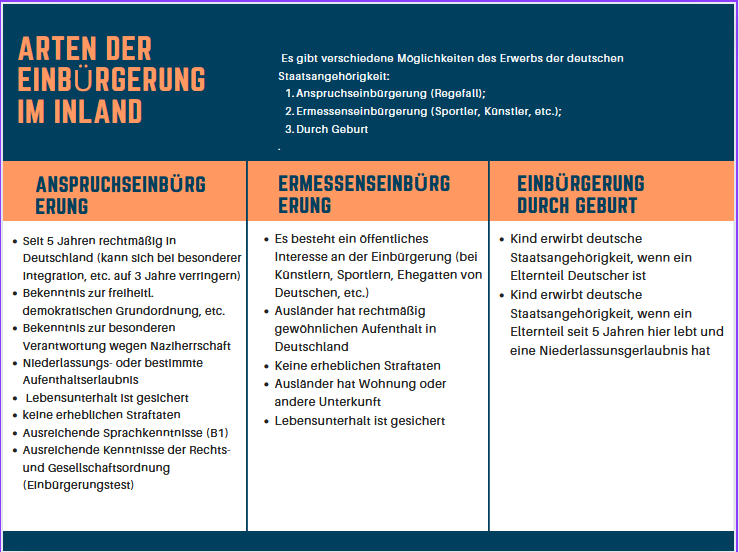Higher Administrative Court of North Rhine-Westphalia, 06.09.2017, Case No.: 19 A 2246/15
Under § 3 Abs. 1 of the German Nationality Act (StAG), nationality is acquired by birth (§ 4), by declaration under § 5, by adoption (§ 6), by issuance of a certificate pursuant to § 15 Abs. 1 or 2 of the Federal Expellees Act (§ 7), by transition as a German without German nationality within the meaning of Article 116 Abs. 1 of the Basic Law (§ 40a), or for a foreigner through naturalization (§§ 8 to 16, 40b, and 40c).
The application for naturalization must be submitted to the competent state authority. Along with the naturalization application, various documents must be provided, including a passport photo, a curriculum vitae, a national passport or travel document, a birth certificate, proof of German language skills, proof of civic knowledge, and income evidence.
Background of the Naturalization Application
The plaintiff, an Israeli citizen of Arab descent and Muslim faith, entered Germany in 1989 for educational purposes. After completing training and studies in Germany, he married a German citizen in 2002. As a result of this marriage, he applied for naturalization in May 2003. The application was approved on the condition that naturalization would only take effect once the plaintiff could prove the loss of his Israeli citizenship. The plaintiff made a declaration of loyalty that included a simple declaration of allegiance.
Activities and Investigation – Participation in Questionable Islamist Seminars
In 2009 and 2010, the plaintiff came under the scrutiny of security authorities due to his participation in various Islamic seminars. He worked as a speaker alongside individuals such as Muhamed Seyfudin Cifti and Pierre Vogel, who were known as controversial Islamic preachers. A particular video that was uploaded to YouTube in 2010 was especially problematic. It contained excerpts from the plaintiff’s speeches and referenced the EZP association, known for spreading Salafist ideology. The plaintiff also acted as a translator and driver for the Egyptian preacher Abu Ishad Al-Huwaini, who also gave lectures for the EZP association. As a result of these activities, an investigation for incitement of hatred was initiated against the plaintiff. The EZP association dissolved in 2011 following investigations under association law.
Rejection of the Naturalization ApplicationRejection of the Naturalization Application
In November 2014, the competent authority rejected the plaintiff’s naturalization application. The rejection was partly based on the claim that the plaintiff, through his sermons and lectures, had violated the free democratic basic order of the Federal Republic of Germany. This decision was supported by assessments from the State Security and the Ministry of the Interior of North Rhine-Westphalia (MIK NRW), which provided concrete evidence of the plaintiff’s anti-constitutional activities.
Lawsuit before the Administrative Court Düsseldorf
In December 2014, the plaintiff filed a lawsuit against the rejection of his naturalization before the Administrative Court Düsseldorf. In his complaint, he claimed that his declaration of loyalty was truthful and that the video used against him did not accurately reflect the actual events. He also denied ever having close contact with Pierre Vogel or the EZP association. However, the Administrative Court dismissed the lawsuit as unfounded. The court argued that the plaintiff did not meet the naturalization requirement of allegiance to the free democratic basic order. The court emphasized that such a declaration must not only be formal but must also be substantively accurate. Given the plaintiff’s activities, his declaration of loyalty was no longer credible at the time of the hearing.
Appeal before the Higher Administrative Court NRW
The plaintiff appealed the decision, arguing that his declaration of loyalty was sincere and that he had not participated in any anti-constitutional activities. He reiterated that the video was manipulated and that he had no contact with radical groups or individuals. However, the Higher Administrative Court (OVG) of North Rhine-Westphalia found no basis to grant the appeal. It upheld the decision of the Administrative Court Düsseldorf and concluded that the plaintiff had no right to naturalization. The authority’s decision from November 27, 2014, was deemed lawful and did not violate the plaintiff’s rights.
Exclusionary Ground under § 11 StAG – Court Found Terrorist Intentions
The OVG based its decision on § 11 Satz 1 Nr. 1 StAG, which excludes naturalization if there are factual indications that the applicant supports efforts against the free democratic basic order. The court found it proven that the plaintiff, through his repeated participation in public events organized by the EZP association and his activities as a translator and speaker, supported such efforts. The plaintiff’s actions were deemed capable of undermining the political and value systems of the Federal Republic of Germany. In this context, the court noted that a high standard of proof is not required to assume anti-constitutional intentions. Concrete facts are sufficient to justify a negative decision.
Conclusion and Final Decision
The OVG further stated that the plaintiff had not credibly demonstrated that he had distanced himself from his previous support of anti-constitutional activities. Although it is not necessary for the applicant to express regret or renounce his previous actions, he must provide external evidence suggesting a change in his internal stance. However, the plaintiff continued to deny his support for the EZP association and showed no insight, making it impossible to ascertain a renunciation of anti-constitutional intentions. Consequently, the naturalization claim under § 10 StAG was ruled out. A claim for naturalization under §§ 9 or 8 StAG was also not considered, as significant interests of the Federal Republic of Germany opposed naturalization. Therefore, the rejection of the naturalization application remained in effect.

Source: Higher Administrative Court NRW
Important Note: The content of this article has been prepared to the best of our knowledge and belief. However, due to the complexity and constant evolution of the subject matter, we must exclude liability and warranty. Important Notice: The content of this article has been created to the best of our knowledge and understanding. However, due to the complexity and constant changes in the subject matter, we must exclude any liability and warranty.
If you need legal advice, please feel free to call us at 0221 - 80187670 or send us an email to info@mth-partner.de
Lawyers in Cologne advise and represent clients nationwide in immigration law.



